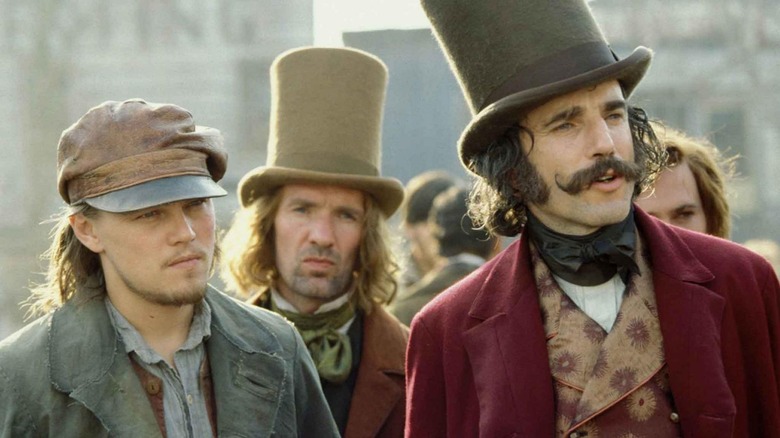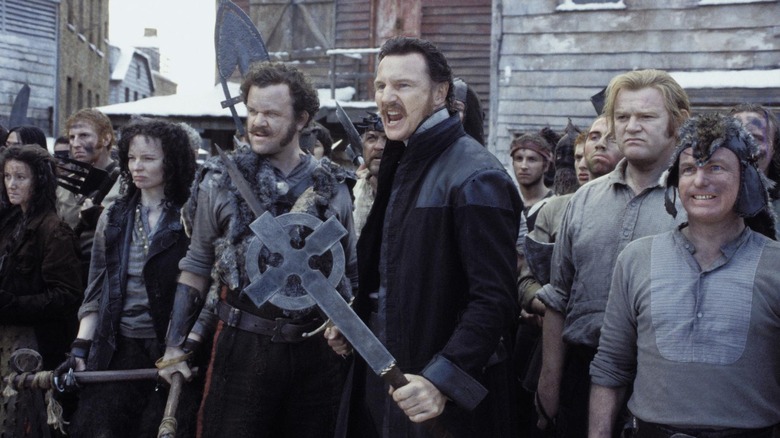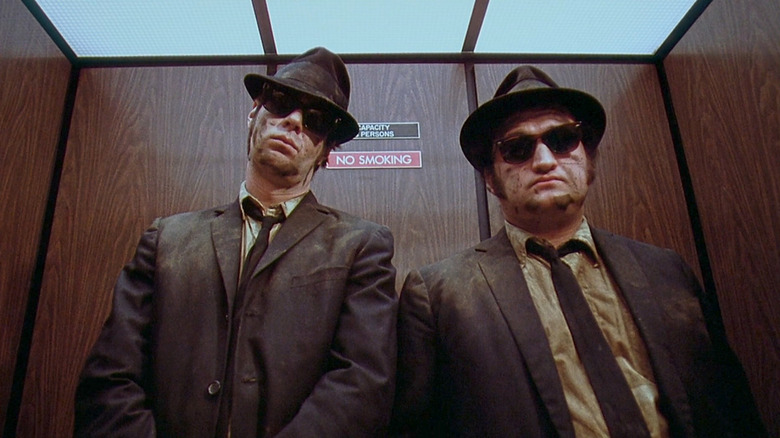Gangs Of New York Could Have Been A Bizarre Blues Brothers Reunion
Martin Scorsese's "Gangs of New York" will be 20 years old this year, and I still can't decide whether I like it or not. It's meticulous but disjointed, sprawling yet claustrophobic, dense but naggingly empty, and packed with authentic period detail while other elements are so glaringly false (hello, Cameron Diaz). It's spectacular, visceral, and immersive, but it feels so frustratingly incomplete.
"Gangs of New York" is a big film that feels much less than the sum of its considerable parts, which is a shame because there was so much potential in Scorsese's long-gestating project, dating back to the '70s when he bought the rights to Herbert Asbury's "The Gangs of New York: An Informal History of the Underworld." The book was a colorful glimpse into the violent times of the city's 19th century slums, and it made sense that the director who made his name with "Mean Streets" and gave us "Goodfellas" would be the person to bring that earlier era of New York gangs to life.
There are plenty of problems with the film, starting with Scorsese's decision to mix wonderful details from Asbury's account with a by-the-numbers revenge story and a weak romantic subplot. Then there is the casting. Beyond Daniel Day-Lewis, hamming it up gloriously as the boss villain, you have a host of excellent actors stuck in completely forgettable roles, with Leonardo DiCaprio and Diaz miserably miscast as the protagonist and his feisty love interest respectively.
I guess it could have been worse when you consider who Scorsese originally wanted in the lead roles: Dan Aykroyd and John Belushi. But would that have been so bad?
So what happens in Gangs of New York again?
"Gangs of New York" opens in 1846 in a wild and snowy Five Points, New York, as a gang of Protestant Natives led by "Bill the Butcher" Cutting (Day-Lewis) engages in bloody battle with a mob of Irish Catholic immigrants calling themselves the Dead Rabbits. After fierce fighting, Bill kills the Dead Rabbits' leader, Priest Vallon (Liam Neeson), leaving his young son orphaned and declaring total victory. Skip forward 16 years, and "Amsterdam" Vallon (DiCaprio) returns to the district to seek vengeance for his father's death. He works his way into Bill's gang and becomes the fearsome leader's protege, waiting for his moment.
In the meantime, he falls for a pickpocket named Jenny (Diaz) while Bill makes his move into politics by backing corrupt official William H. Tweed (Jim Broadbent). After a jealous rival love interest reveals Amsterdam's true identity, he goes into hiding but re-emerges at the head of the resurrected Dead Rabbits gang, persuading some of his father's oldest and hardest former associates to join him. As hostilities between the two gangs resume and both prepare for another deadly battle for supremacy, the Civil War draft riots break out and disrupt their brutal turf war.
Scorsese's first cut was well over three hours long, but came under pressure from Harvey Weinstein to trim it down to the more manageable 167-minute version we have today. Despite its hefty length, it feels like a film that has had a lot of its flavor and texture stripped away, with much of the fascinating historical detail relegated to scenery while the generic fictional story is spread way too thinly. I find myself wishing for a VR edition where I could break away from the plot and just explore the marvelous sets instead.
The Blues Brothers in Gangs of New York?
Like many big Hollywood movies, "Gangs of New York" had some interesting alternative casting stories. The biggest one was that Robert De Niro was originally cast as Bill the Butcher. He and DiCaprio starred together in "This Boy's Life" when the latter was a teen, and it would have been an interesting passing of the torch from one Scorsese muse to another. De Niro left the production due to long delays and was replaced by method man Day-Lewis, who did his method thing and learned from a real butcher for the role.
Other casting alternatives include Mel Gibson attached to DiCaprio's role opposite Willem Dafoe. At once time Sarah Michelle Gellar, at the height of her "Buffy" fame, was onboard to play Jenny but had to quit due to her commitments to the show (via Times of San Diego).
Then you have Scorsese's original picks for Vallon and Bill the Butcher: "The Blues Brothers" duo Dan Aykroyd and John Belushi. I can see Belushi doing something interesting as BIll, but what about Aykroyd? It sounds ridiculous at first, but DiCaprio hardly reveled in the role of Vallon, looking ill-at-ease and vanishing into the foreground. He went on to great things with Scorsese, but looked out of his depth here.
Early in his career, Aykroyd would have brought plenty of energy to the part, and he has delivered some solid dramatic turns too, picking up an Oscar nomination for "Driving Miss Daisy." Scorsese also has form drawing memorable performances from comic actors, such as Sandra Bernhard and Jerry Lewis in "The King of Comedy." So while the idea of Jake and Elwood Blues starring in "Gangs of New York" looks wild on paper, maybe they could have pulled it off. After all, they were already on a mission from God.


